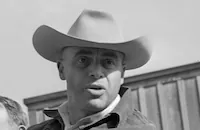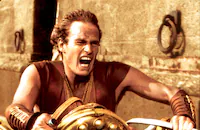The Hawaiians

Brief Synopsis
Cast & Crew
Tom Gries
Charlton Heston
Tina Chen
Geraldine Chaplin
John Phillip Law
Alec Mccowen
Film Details
Technical Specs

Synopsis
Whip Hoxworth returns to Hawaii with a boatload of indentured Chinese laborers to find that his grandfather has died, leaving his fortune to Whip's cousin, Micah Hale. Unwilling to work for Micah, Whip establishes his own plantation with the help of the Chinese laborers, including Nyuk Tsin and Mun Ki, a couple who were brought on the boat. Milton Overpeck, an engineer, persuades Whip to drill for water, and when the well succeeds, irrigation becomes possible for the previously barren land. Whip gives Nyuk some land, and with her help, he turns the plantation into a prosperous pineapple enterprise. Purity, Whip's Hawaiian wife, is not happy, however, and leaves to rear their son Noel in native Hawaiian fashion; and Nyuk goes to a leper colony with her husband when he develops the dread disease. Many years later, Nyuk, whose children are now embarking on prosperous careers, returns to the island and finds Whip living with a Japanese mistress. When Queen Liliuokalani, the sovereign of native Hawaiians, tries to reestablish her dominion over the island, Whip succeeds in deposing her, and Micah is appointed president of the new Republic of Hawaii. Disaster strikes again, however, as a plague hits, and the Chinese ghetto is burned to the ground to prevent the spread of infection. Whip offers to help rebuild the burned section of the city and to help restore the financially ruined Nyuk. Finally, both agree to a marriage, which they had previously opposed, between Whip's son Noel and Nyuk's daughter Mei Li.

Director

Tom Gries
Cast

Charlton Heston
Tina Chen

Geraldine Chaplin

John Phillip Law

Alec Mccowen
Mako
Don Knight
Miko Mayama
Virginia Lee
Tanya Chang
Naomi Stevens
Harry Townes
Khigh Dhiegh

Keye Luke

James Gregory

Lyle Bettger
Mary Munday
George Paulsin
Jules Martin
Winston Char
Michael Leong
Randy Kim
Victor Young
Bill Fong
Chris Robinson
Mark Lebuse
Mathew Fitzgerald
Bruce Wilson
Mailie Mccauley
Alan Naluai
Forrest Wood
Murray Staff
Harry Holcombe
Daniel Kaleikini Jr.
Galen Kam
Herman Wedemeyer
Victor Sen Yung
Soo Young
James Hong
Elizabeth Smith
Eric Lin
Moon Chu
Eddie Pang
Wayne Chow
Jeffrey Chang
Steve Choy
Crew
Newt Arnold
Lucien Ballard
Sass Bedig
James Berkey
Byron Brandt
George Chan
Jim Henderling
Philip Lathrop
Henry Mancini
Robert Martin
Daniel J. Mccauley
Walter Mirisch
Edward Morey Jr.
Cary Odell
Richard Portman
Chuck Roberson
Robert Stambler
Bill Thomas
James R. Webb
Ralph Winters
Fred Zendar

Film Details
Technical Specs

Award Nominations
Best Costume Design
Articles
The Hawaiians
Charlton Heston stars as Whipple "Whip" Hoxworth, the disenfranchised grandson of one of Hawaii's leading white settlers (played by Richard Harris in Hawaii), who left him nothing and inspired Whip to create his own fortune in pineapples. Geraldine Chaplin is his highborn Hawaiian wife, who has a mental breakdown after giving birth and goes native. But the real star of the picture is Tina Chen, a young medical technician who had almost no acting experience. She plays as Nyuk Tsin, who comes to Hawaii aboard one of Whip's slave-labor hauls and ends up becoming a matriarch of the island, respected by the locals and her own large family.
The film's cinematography, by Lucien Ballard (The Wild Bunch, 1969) and Philip Lathrop (The Pink Panther, 1964), delivers the appropriate epic look to the story, beginning with the film's opening aboard Whip's ship. Such grand scale photography had its problems, though. Heston recalls in his autobiography In the Arena: "From shooting on a ship we moved to shooting from a chopper, which also has its problems. It can give you wonderfully acrobatic shots, not possible before the quantum leap in a helicopter design provided by the Vietnam War, but it's almost as tricky as filming on the water. What looked like a fairly simple shot-throwing a dead leper from a cliff into the sea off the leper island of Molokai-was vastly complicated by the chopper's problems. We spent half a day on it."
The Hawaiians is directed by Tom Gries (father of The Pretender's Jon Gries), who had collaborated with Heston on what many believe is the actor's finest film, Will Penny (1968). Gries and Heston had just finished another film prior to work on The Hawaiians - Number One (1969) - about a pro quarterback pushing forty. In his autobiography, Heston remembers his ambivalence towards his role in The Hawaiians: "I tried my best to dismiss my anxieties about Whip Hoxsworth's structural function on the film. Maybe this blunted the swordblade edge an actor should bring to any role. If that's so, I have no excuse for it." Heston expressed concern about not being more involved in his part throughout his journal entries for the production. He says he told producer Walter Mirisch (Hawaii) from the beginning that the real story revolved around Tina Chen's character and not his own. "You also need to fall in love with the guy you're playing, to marry his story....I'd certainly done it with Tommy Gries on Will Penny and Number One, but we somehow fell short on The Hawaiians."
Despite Heston's admitted disengagement from his character, The Hawaiians manages to create a compelling picture of a turbulent time that is still not well understood. The film was nominated for the Oscar® for Best Costume Design and Tina Chen was nominated for the Best Supporting Actress Golden Globe.
Producer: Walter Mirisch, Robert Stambler
Director: Tom Gries
Screenplay: James Michener (novel), James R. Webb
Cinematography: Lucien Ballard, Philip H. Lathrop
Film Editing: Byron 'Buzz' Brandt, Ralph E. Winters
Art Direction: George B. Chan
Music: Henry Mancini
Cast: Charlton Heston (Whipple Hoxworth), Geraldine Chaplin (Purity Hoxworth), John Phillip Law (Noel Hoxworth), Mako (Mun Ki), Khigh Dhiegh (Kai Chung), Don Knight (Milton Overpeck).
C-134m. Letterboxed.
by Emily Soares

The Hawaiians
Quotes
Trivia
Notes
Location scenes filmed in Hawaii. Film is a sequel to Hawaii, q.v.

Miscellaneous Notes
Released in United States Summer June 1970
Based on James Michener's novel "Hawaii" (New York, 1959).
Released in United States Summer June 1970














